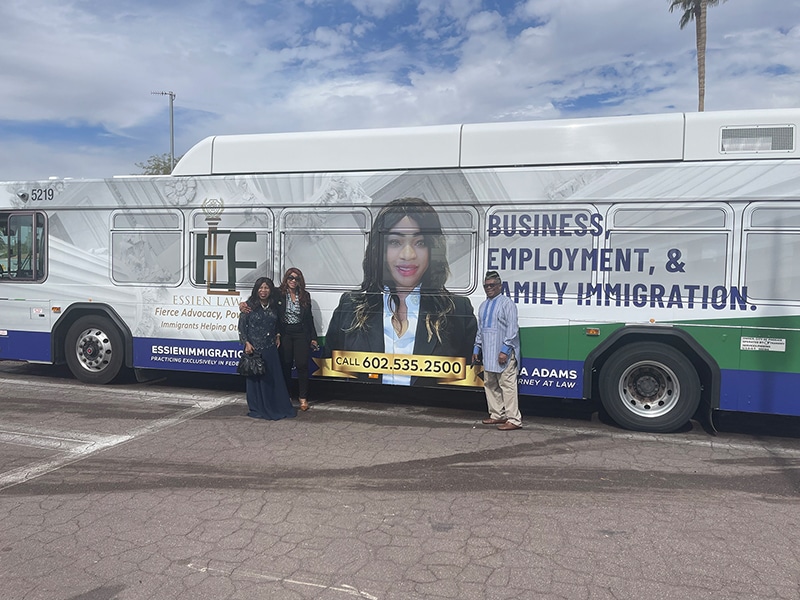Photo courtesy of Lelia Adams
For more than 20 years, Phoenix-area buses have incorporated advertisements on exterior panels, but for the first time ever, a woman of color is being featured.
Last month Lelia Adams, Esq., a Valley attorney who specializes in immigration law, became the first black woman to be pictured on a Valley Metro bus, thanks to a collaboration with Lamar Transit of Arizona.
“It is especially impactful for minority communities who utilize public transportation in the Valley to see someone who looks like them and provides much needed legal services,” says Renee duPlessis, Lamar Advertising representative.
When Adams was a child in Nigeria, Africa, she walked more than three miles a day to collect clean drinking water. Never did she imagine she would have her face on the side of a Valley Metro bus in the Phoenix.
“My dad hated idleness,” Adams says. “Even when going to fetch water, I was expected to be studying. He would buy a newspaper and tell me to summarize it. It was very annoying, but that skill serves me well in my professional life now.”
Today, as an attorney at Essien Law Firm, in Phoenix, Adams specializes in immigration, family-based petitions and family reunification, nonimmigrant visas for students/exchange visitors, investment-based immigration, as well as employment-based immigration, deportation and removal and asylum.
Her passion to help those seeking immigration comes from a very personal place. When she was 16 years old, Adams and her family came to the U.S. through an immigration program known as the “Green Card Lottery.” Officially known as the Diversity Immigrant Visa Program, the program provides up to 50,000 immigrant visas annually. Only those from countries with low rates of immigration to the U.S. are eligible to register and winners are selected randomly. Adams’ father was among them.
However, her mother was deported after a critical misunderstanding of one aspect of the immigration process. Watching her mother get deported was the driving force behind Adams’ desire to pursue a career in law with a focus on immigration.
“After my mother was deported, I had one single goal – to bring her back to the U.S. no matter what,” Adams says. “The day I got my license to practice law, I got all the documents I could for my mom and started petitioning to get her back. After my mother’s application was accepted, I cried my eyes out. Although I had officially graduated and passed the bar, this personal success made it feel like I had finally completed law school.”
When the bus with Adams’ photo was unveiled, her aging parents were on hand to see the display.
“The day I saw the bus for the first time, I kept pinching myself. I never imagined that I would one day leave my village and make the journey to America, let alone have my picture on a bus,” Adams says.
“The idea of having an advertisement for my law business on American streets is something the little girl who grew up without electricity in a tiny African village could have never dreamed of. Sometimes I cannot believe this is my life.”





